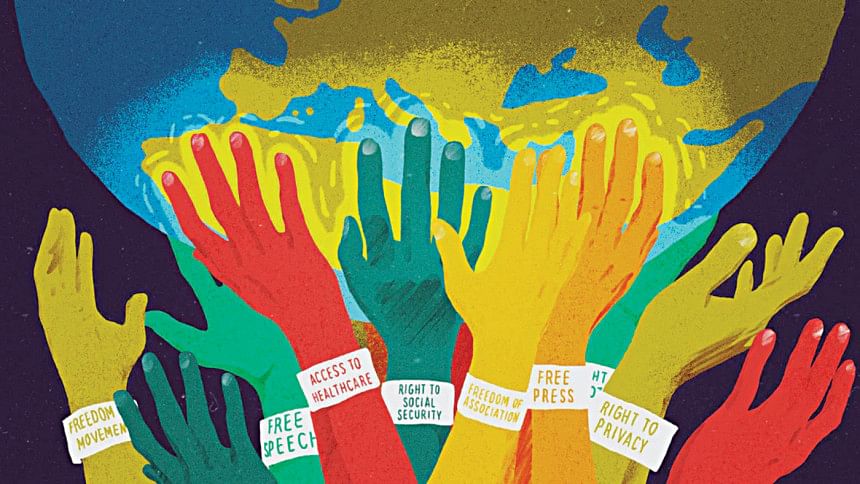Covid-19 and State’s obligation to safeguard human rights

With the outbreak of the Covid-19 and the declaration of a global pandemic, nations worldwide have taken unprecedented and unconventional measures with the aim to contain the virus and fortuitously, declared both international and intra-national lockdowns, and asking citizens to self-isolate and to maintain social distancing at all times.
Although this lockdown has proved to be effectual, it has also surfaced the divergence between the upper and lower class of the society. Globally, it has hit hard on the daily wage earners, poor and needy class of the society. Among many other fundamental rights that an individual is entitled to, this pandemic and the incidental lockdown has resulted in such rights being compromised.
The first and foremost right relates to the right to housing, which is enshrined in article 15 of the Bangladeshi Constitution. Internationally, the right is recognised under article 25 (1) of the UDHR, and article 11 (1) of the ICESCR. The Committee on Economic, Social and Cultural Rights states that, state parties have the obligations to take steps such as abstaining from forced evictions, devising national housing strategy, monitoring the implementation of the right. In making law or policy, the states are also obliged to give due priority to those living in unfavourable conditions.
With the spread of Covid-19, for instance, nations like the United Kingdom have adopted several action plans to provide shelter to the homeless and to protect them from the pandemic. Moreover, in Bangladesh, at a press conference on 23 March 2020, the Cabinet Secretary, stated that the government has built residential and livelihood facilities in Bhashan Char, Noakhali; and people willing to relocate there have been welcomed to avail such facilities. Furthermore, all district administrations were instructed to send people from low-income groups to make use of the island's facilities. For a developing nation like Bangladesh, where still 24% of the population live under poverty line, this initiative of the government has been an applaudable one. However, none from the low-income groups has responded to the government offer.
Inevitably, ensuring access to other basic necessities such as food, clean water, sanitation is also crucial during this difficult time. In Bangladesh, approximately 32% of the population work in the informal sector and majority of whom are daily wagers and around 4.2% of the population are unemployed. Under such circumstances, approximately 40% of the population struggle to meet their essential needs, which is further worsened by the current hike in unemployment rate.
Article 15 of the Constitution requires state to ensure people's access to basic necessities including food, clothing shelter and medical care. Additionally, under International law, article 25 of the UDHR recognises the right, in the context of an adequate standard of living, also recognised by the ICESCR under article 11(1).
Once again, it is worth mentioning the appreciable steps taken specially in allocating substantial amount of funds by the Bangladesh government in order to ensure access for this portion of the population. Prime Minister Sheikh Hasina announced her support for the coronavirus hit workers and the poor by providing a 5,000-crore taka incentive for export-oriented industries that would hopefully be spent to pay wages for workers; also announcing wider safety net measures for low-income and homeless people. Further ensuring that low-income people will receive government assistance under the "Ghore-Fera" (Returning Home) programme. Additionally, as per government's announcement, the homeless and landless will get free housing, food for six months as well as cash support. Meanwhile, the Disaster Management Ministry has initiated the dispatch of 500 tonnes of rice and cash between Taka 5 lacs and Taka 10 lacs to all the district administrations. Unfortunately, there have incidents of such aid not reaching the affected population due to corrupt local representatives; but it can be expected that with effective delivery mechanisms the situation will be developed as the lockdown progresses.
Another basic right which has come to forefront is the right to health and medical care. article 18 (1) of the Constitution recognises this right, also recognised in the 1966 ICESCR.
As the percentage of Covid-19 positive cases continue to rise exponentially, the demand for adequate and well-equipped health care organisations is more important than ever. In this regard, the government has announced to allocate Taka 1.0 billion for government physicians and health workers treating Covid-19 patients, Taka 7.5 billion for health and life insurance for those affected while on duty. Furthermore, in order to ensure adequate facilities for coronavirus patients, more than eight hospitals have been designated, in the capital. Other than this, treatment centres and testing centres are also made available in every division and major districts. Notwithstanding, there have been reports of the hospitals lacking sufficient personal protection equipment (PPE) for physicians and nurses and shortage of intensive care unit (ICU) and ventilators facilities. Hence, there is still need for more investment in the healthcare sector
It is apparent that, the Covid-19 pandemic has brought about certain unprecedented developments in the way governments including that of Bangladesh are ensuring the basic fundamental rights. The nature of the pandemic has obligated nations worldwide to take initiatives ensuring these basic human rights if they are to curb the long-term consequences of the pandemic. There is an abrupt change in the approach of the government, who generally show reluctance in addressing human rights issues but are now taking all the apt measures in their capacity. Whilst their relentless and unprecedented efforts in providing shelter, food and other essentials, hence, ensuring the fundamental rights of all citizens, during these unprecedented times is commendable, the question arises – do the statutes and charters ensuring fundamental rights only warrant implementation during a pandemic or when there is a greater need to sustain the world or the whole country?
The writer is an Associate at The Legal Circle.

 For all latest news, follow The Daily Star's Google News channel.
For all latest news, follow The Daily Star's Google News channel. 



Comments